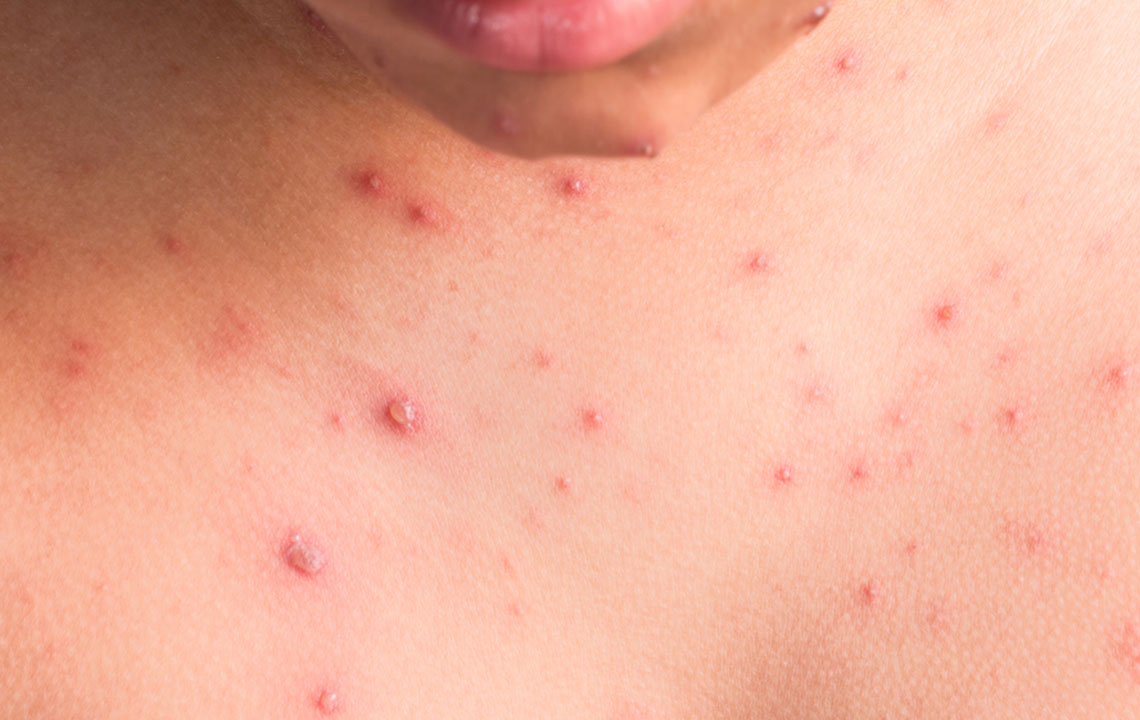Rashes from Tick Bites – Diagnosis, Consequences and Remedies
Ticks are found in the outdoors, living in grass, leaf piles and shrubs. They have a strong affinity for humans and their pets and easily migrate from one to the other. While these bugs may seem tiny and harmless, in reality, they literally suck your blood for sustenance.
Ticks attach themselves to the victim and bite, drawing blood till their appetite is sated, growing in size, sometimes as big as a marble.

While a rash from tick bites can cause irritation, itching and a burning sensation on the affected skin, it’s often an indicator of a more serious, harmful disease’s onset. Below, we’ve mentioned some of the other consequences and diseases that a tick bite can leave you with. If you experience a rash from tick bites, keep an eye out for these diseases.
Rocky Mountain Spotted Fever (RMSF)
RMSF is the most serious of all tick-borne diseases. It’s more common in the south-eastern parts of the United States. It is not contagious, but it can pass through ticks bites, from humans to their pets, and vice-versa. The symptoms appear between 2 to 14 days after the bite, and include:
- High fever persisting for 2 to 3 weeks
- Chills
- Fatigue
- Abdominal pain
- Nausea
- Muscle aches
- A headache
The characteristic feature of Rocky Mountain spotted fever is the rash from the tick bite. The rash comprises of small red spots on the palms, ankles, wrists, and soles. The rash starts 2 to 5 days after the bite and spreads across the torso. This is usually coupled with a high fever.
After a week of the infection, a second rash can develop from the tick bite. This is usually a reddish purple in color. This is an indication that the disease has progressed and become more serious. You must start treatment before this rash appears!
The treatment for RMSF is an oral antibiotic known as doxycycline. It’s highly recommended that you consult a doctor, and start taking the medication as soon as you experience the symptoms. If your doctor suspects you may have Rocky Mountain spotted fever, start the course of the medication before the diagnosis is confirmed.
Time wasted in waiting for a lab report could mean the difference between life and death. The idea is to start treatment without any delay, preferably within the first five days of infection. If you don’t begin with the medication within the first five days, you are most likely to receive intravenous antibiotics, after being admitted to the hospital. If you face more complications, your stay in the hospital is likely to be prolonged.
Lyme Disease
Lyme disease is caused by the transfer of bacteria from the tick when they bite the human. It is common in the northeastern parts of the United States. There are three stages of Lyme disease:
Early localized rashes: A Lyme disease rash is easy to identify. It has a unique and characteristic circular rash, shaped like a bullseye. The rash first forms around the bite and then, a ring forms around it. This rash then grows, and spreads outwards, in the subsequent days or weeks.
Most people are caught off-guard by a rash from tick bites, but the emergence of this bullseye-shaped rash is a clear and simple sign that you’ve been infected with Lyme disease. You need to visit a doctor immediately and take the steps required to ensure that your Lyme disease doesn’t get worse.
Antibiotics have been proven to help treat, and even cure Lyme Disease when caught in the early stages. Antibiotics used for treatment will differ, depending on which part of your body has developed a rash from tick bites. These antibiotics include:
- Oral amoxicillin
- Cefuroxime axetil
- Doxycycline
Visit a doctor immediately if you see a bullseye rash on your skin. Lyme disease needs to be treated as early as possible, or it’ll advance to its second and third stages.
Early disseminated disease: As Lyme disease progresses without treatment, it affects the heart and nervous system causing paralysis and tremors. The onset of Meningitis is possible at this stage.
Late disease: Your nerves are likely to suffer damage, and you will experience a loss of sensation. This could also result in neurological damage, inflammation of the joints, and arthritis.
Ibuprofen and other similar painkillers can help ease the pain. Anti-inflammatory drugs can also help ease the symptoms and pain of the later stages.
Colorado Tick Fever
Colorado tick fever is the least harmful disease caused by tick bites. It is more common in the western USA. The symptoms include :
- Fever
- A headache
- Chills
- Mild rashes in some of the cases
The symptoms usually go away in 7-10 days. The fever and muscle aches can be treated with pain relief medication, and it’s important to stay hydrated.
Always be cautious when traveling in the woods and the outdoors. Ensure you’re fully clothed, and use bug repellant to protect yourself. Better safe than sorry.

